Conversations: Madeleine von Mohl
- Created: Wednesday, 06 June 2012 15:21
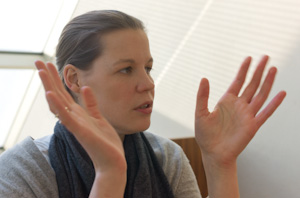 Madeleine von Mohl is one of six founders of Betahaus,
a co-working space with workshops,
a café, meeting rooms, and office space. Individuals or companies can rent desks by the
day or by the month. With its flexible approach, Betahaus is an example of a
new model for organizing work. It is rapidly expanding beyond its home base at Moritzplatz.
Madeleine von Mohl is one of six founders of Betahaus,
a co-working space with workshops,
a café, meeting rooms, and office space. Individuals or companies can rent desks by the
day or by the month. With its flexible approach, Betahaus is an example of a
new model for organizing work. It is rapidly expanding beyond its home base at Moritzplatz.
For years Moritzplatz was an area in Berlin that had slipped off the city's mental map. Located in Kreuzberg near the former path of the Berlin wall, it has been transformed in the last few years by exemplary locally grown projects like Prinzessinnengärten, The Aufbauhaus, Planet Modulor, and of course Betahaus.
This is the first in a series of conversations with the people behind Berlin's locally grown projects, which make the city such an interesting place.
We are interested in the stories behind the projects, and how they are told. We're pleased to have had a chance to talk with Madeleine. Here are some excerpts from our two-hour conversation.
Madeleine told us how she met her partners, where their idea came from, and how they got started four years ago (2008). We also wanted to find out how the Betahaus fits in the city, and what ideas like this could do to transform urban development.
Please join us on this sunny afternoon in our office, or skip ahead to the section that interests you most.
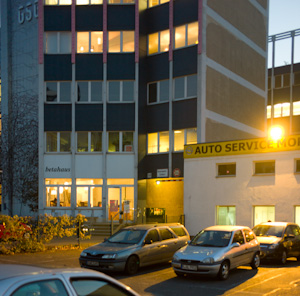 Matthew Griffin (MG): How did you grow up, and what influence
did that have on the creation of Betahaus?
Matthew Griffin (MG): How did you grow up, and what influence
did that have on the creation of Betahaus?
Madeleine von Mohl (MM): I grew up in Bad-Segeberg, Schleswig Holstein [West Germany]. In '92 our family moved to an old farm house in the countryside between Gotha and Erfurt [both ex. East Germany]. I grew up on building sites, from age 10 to 16, because my parents renovated two old farms. The smell of fresh concrete always reminds me of home.
Britta Jürgens (BJ): Do makeshift, hands-on situations excite you?
MM: I'm interested in unfinished situations. Moments when you can find chances to grow, and develop.
In Bad Segeberg, everyone around me was in the same situation. They all had a house, a yard, a pony, and the lake at their front door. Suddenly we were in Erfurt, a real city, the opposite of Bad Segeberg. I was new, and for the first time, an outsider.
Fortunately I went to a new school. It was a colourful mix of kids from East and West, city and country, Catholic and Protestant – that was great!
After high school I went to Washington DC for half a year. When I returned in 2001, I started studying in Dresden. Actually I wanted to go straight to Berlin, but unfortunately didn't get accepted to Humboldt University.
Coincidence
BJ: What did you study?
MM: History and German. For me, my many internships were the most important part of my studies. I had plenty of time to try things out. By the way, I met my current colleague Christoph Fahle in Portugal during a semester abroad. At the time, we exchanged only a few words. Two years later, we met again in Breslau.
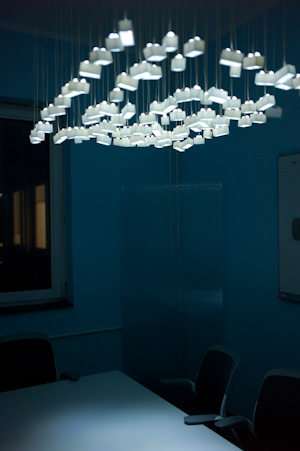 During the summer break I did another internship, this time in Brussels, because
I was interested in European politics. Suddenly, a call for proposals from a
European youth project landed in my mailbox. It was called Europe Train,
and focused on Eastern Europe. You could earn a ticket on the train by submitting an
idea to bring EU citizens closer together. I came up with a film project, and won
a ticket! I asked them to help me organize a camera but they said,
“You have to sort that out yourself, we have no budget for it.”
During the summer break I did another internship, this time in Brussels, because
I was interested in European politics. Suddenly, a call for proposals from a
European youth project landed in my mailbox. It was called Europe Train,
and focused on Eastern Europe. You could earn a ticket on the train by submitting an
idea to bring EU citizens closer together. I came up with a film project, and won
a ticket! I asked them to help me organize a camera but they said,
“You have to sort that out yourself, we have no budget for it.”
In the middle of winter, I went to Breslau, Poland, for the preparatory seminar. I was standing at the station, and who else was waiting for the train? Christoph from Portugal – a year and a half later!
I was like, “Hey what are you doing here? We met on the beach in Portugal!” “Wow we did,” he said, “I'm Christopher,” and then he starts telling me about his Europe project. It was exactly the same idea I had! He also knew how to handle a camera. From then on we started to work together.
In the mean time, Christoph had set up Politikfabrik, a student agency here in Berlin. We began working together there in 2006. Have you heard of the Wahlomat? The Politikfabrik developed it.
BJ: Sure, I just used the first time.
Why isn't there an office that can expand and contract project by project?
MM: The Politikfabrik was the starting point for what we are doing now with Betahaus. Our office was 150 square meters [ca. 1, 500 sq-ft]. When we were writing proposals, there were three of us using the 150 sq m. Far too big and too expensive. When we were working on a project, we suddenly had 30 volunteers and freelancers, and the office was too small and we would could have afforded an office twice the size. We asked ourselves: “Why isn't there an office that can expand and contract project by project?”
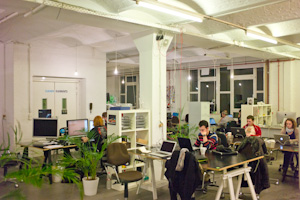 BJ: The Betahaus was born out of your own needs!
BJ: The Betahaus was born out of your own needs!
MG: What year was that?
MM: We met in Breslau in 2005, and we began talking about the Betahaus for the first time in the summer of 2008. For a while, Tonia Welter, a product designer from the UDK [Berlin's University of the Arts], had been talking with Christoph about the future of work, and finding a place to try it out. “At university we worked together in shared studios and workshops,” Tonia said. “We helped and inspired each other, despite the fact that we were competing against each other. As soon as we graduated, we each had our own studios, and stopped looking over each others shoulders. Why can't we continue doing something like that as professionals?” Our practical experience and theoretical discussion collided when we wrote the business plan for Betahaus with Maximilian von der Ahe (lawyer), Stephan Bielefeldt (who studied business), and Gregory Scheppan.
BJ: By this time, all of you had already had years of business experience.
MM: Project and team experience for sure, but we had all been working in our own fields, none of us had ever started a company.
MG: Was there a point when you said: “OK, that's what we want to do”? When was it?
You are absolute dreamers, I don't think it's going to work, but I like you
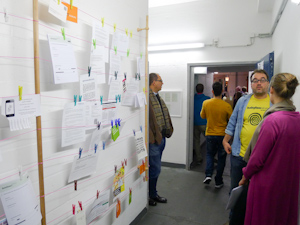 MM: Sometime during the summer of 2008, Christopher, our
idea machine, sat us all down at the table. By autumn 2008 we had started looking
for office space. We moved into our current location in Prinzessinnenstrasse
just before Christmas. In the mean time, we had seen tons of real estate that
had been renovated to death in Prenzlauer Berg - not our thing! When we saw the
space in Prinzessinnenstrasse, we knew right away. We were standing there and
thought, “This is it – plenty of space, we can make it work.”
MM: Sometime during the summer of 2008, Christopher, our
idea machine, sat us all down at the table. By autumn 2008 we had started looking
for office space. We moved into our current location in Prinzessinnenstrasse
just before Christmas. In the mean time, we had seen tons of real estate that
had been renovated to death in Prenzlauer Berg - not our thing! When we saw the
space in Prinzessinnenstrasse, we knew right away. We were standing there and
thought, “This is it – plenty of space, we can make it work.”
BJ: It was a gut feeling?
MM: And, above all, a property manager who believed in us! In no time, we had an appointment with the manager to present our business model. The then managing director said, “You are absolute dreamers, I don't think it's going to work, but I like you. I'll make an exception for you – you can rent the space for a few months, and if it doesn't work out, you can leave, no strings attached.”
BJ: It's not like they were taking a big risk.
MM: They changed a few things for us, like building a new door for the café. We were pretty happy that we didn't have to commit to five years right from the start.
MG: had you already written a business plan before you started looking for a space?
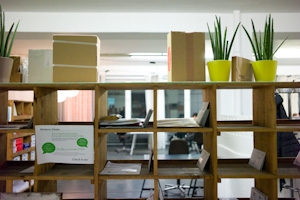 MM: We had written a classic business plan – we needed it,
even just to open a bank account and overdraft.
MM: We had written a classic business plan – we needed it,
even just to open a bank account and overdraft.
MG: How much capital did you have when you started?
MM: We had the minimum required to found a German corporation. The first profits went straight back into the company.
BJ: Were you all working somewhere else to earn money?
MM: Yes, during the first few months, everyone had another job. I was working for the Bundestag [parliament], the others had consulting contracts, and Max was working in a law firm.
But we were lucky, from day one! I got a call from a guy from the music industry, who moved in the next day with ten employees, and all his office furniture! Word spread like wild fire.
1,000 people partying 'til six in the morning
MG: So it took off right away. Suddenly you had a furnished office, the first month's rent and the tenants were flocking to you.
MM: Right, from January to April first, we ran a test phase, called Betalab. The first 250 square meters were full within a month. We leased another 250 sqm right away, and at the same time we converted the ground floor into a café. Betahaus opened officially on April 1st.
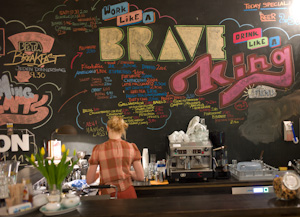 BJ: Wait a minute, after three months you had already opened the cafe?
BJ: Wait a minute, after three months you had already opened the cafe?
MM: Yes, we had a huge opening party. Create Berlin did an installation that ran through the whole building. The reaction to the party blew me away. We had 1, 000 people standing outside the door, partying 'til six in the morning. It took us two weeks to get the floor clean again, because of course we had still didn't have a cleaning company.
During the first three months, we always emphasized that it was all an experiment. Every week we sat down with our clients and asked, “How do you like it? What do you need?”
MG: That was the test phase, but what had you negotiated with the landlord? Did you have an option in the contract?
MM: If push had come to shove, we could have gotten out after three months. But the moment we said “we're staying!” we were bound by the contract, which we are now extending.
BJ: You still have the first lease?
MM: Yeah, but we kept renting more space. Now we have five leases running in parallel.
BJ: Piecemeal, as needed. Ideal.
MM: Yes, and then we had to get our day to day business up to speed. We grew, and grew, and grew. By May 2011 we had founded two more, one in Cologne and one in Hamburg. They also continued to grow and suddenly we realized that the superstructure hadn't kept pace. Our accounting system and process management was built to manage 30 tenants and not 200! Between May and December 2011, we completely revamped our management system. We hired a coach to help us refine our job profiles, and the processes behind our business. He helped us a lot. Our challenge for 2012 is to set up houses in Barcelona and Sofia.
Madeleine, you can tell your colleagues that you've found your first investor!
MG: How big is your team?
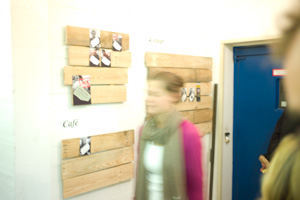 MM: We are still the same six founders and we have two silent
partners on board. Neither of them are involved in our daily operations, but they help
us with strategic planning. We meet them every couple of months.
MM: We are still the same six founders and we have two silent
partners on board. Neither of them are involved in our daily operations, but they help
us with strategic planning. We meet them every couple of months.
MG: At what point did they come on board?
MM: Pretty early on. I called one of them right at the outset, to ask him how to find investors. We talked for an hour or two, and at the end he said, “Madeleine, you can tell your colleagues that you've found your first investor!”
In both Hamburg and Cologne, we have local partners with a stake in their branch - it's a great motivation.
MG: Did you found a new company for each local Betahaus?
MM: So far we have, but in Sofia we are testing a different model.
Like our clients, we are constantly moving around
BJ: Did you plan to expand right from the start? With today's instant information flow, it is so important to go full speed ahead with a new business idea, before all the copy-cats catch up.
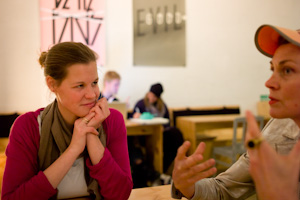 MM: We had always planned to open other branches. Like our
clients, we are constantly moving around. It doesn't matter to us which city we're in.
Suddenly one day we got a call from the Hamburg Co-Working Initiative. They wanted to
come by for a visit. This sparked a huge discussion in our team. We're six people –
some said, “That's the competition, we shouldn't tell them anything,” but Christoph
said, “They are our sisters and brothers in spirit, they belonging to the community.
Of course we will support them!” Well, we met somewhere in the middle, and decided to run a
co-working-day in Berlin and invite
everyone who was interested to discuss everything but the numbers.
MM: We had always planned to open other branches. Like our
clients, we are constantly moving around. It doesn't matter to us which city we're in.
Suddenly one day we got a call from the Hamburg Co-Working Initiative. They wanted to
come by for a visit. This sparked a huge discussion in our team. We're six people –
some said, “That's the competition, we shouldn't tell them anything,” but Christoph
said, “They are our sisters and brothers in spirit, they belonging to the community.
Of course we will support them!” Well, we met somewhere in the middle, and decided to run a
co-working-day in Berlin and invite
everyone who was interested to discuss everything but the numbers.
The day totally inspired us. The people from Hamburg said, “Hey, we think everything you guys have set up here is so great. It makes no sense for us to try and go it alone in Hamburg. Let's do it together.” Our leap of faith paid off. We founded Betahaus Hamburg together with five of them. Actually, we are looking for a new manager for Hamburg right now.
I liked the fact that the area was unfinished, unmarked. Moritzplatz was uncomfortable, unknown and edgy.
MG: We'd like to hear how your project has changed the city. The last few years have been exciting around Moritzplatz – Prinzessinnengärten, Aufbauhaus. How did you contribute to this change?
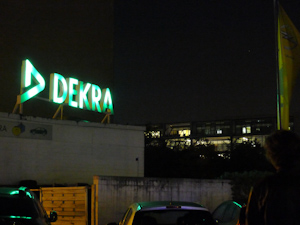 MM: When we opened in 2009 Moritzplatz was still
uncharted territory. At the time, Andreas Krueger [from Planet Modulor] told
us about his plans for the Bechsteinhaus [now Aufbauhaus]. A few weeks later a
couple of gardeners came by with their plans for a garden, it all sounded very far off.
MM: When we opened in 2009 Moritzplatz was still
uncharted territory. At the time, Andreas Krueger [from Planet Modulor] told
us about his plans for the Bechsteinhaus [now Aufbauhaus]. A few weeks later a
couple of gardeners came by with their plans for a garden, it all sounded very far off.
They always met at our café, because there was nothing else around. I'll never forget the herd of kids in rubber boots stomping through our café to get water! It took them a while to get their own water hookup.
When we started, everyone asked us, “Why on earth do you want to go to Moritzplatz?” Now Moritzplatz is suddenly in. People even come by accidentally now!
MG: Was there any particular reason why so much happened all at once? Were you more interested in the building itself, or the area it was in?
MM: I liked the fact that the area was unfinished, unmarked. We also looked at buildings in Prenzlauer Berg, but there we would have been one amongst many. We liked the frontier feeling at Moritzplatz, it was uncomfortable, unknown and edgy. It felt like a challenge. It has changed completely in the last year.
MG: Do you think that you contributed to this change?
MM: Yes, I think we did, but it wasn't hard with neighbors like Prinzessinnengärten and Modulor. We have certainly transformed our building. The old tenants have all left, and the rents have gone up.
MG: What aspects of the building contributed most to your success? You have spoken about its unfinished character.
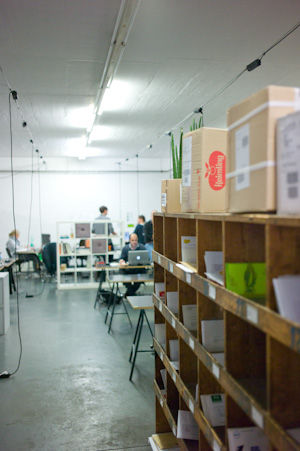 MM: We added an opening to the front, so people could
walk straight in [through the café]. At the beginning it was great to have so
much space that we could slowly fill. Now it's getting tight. A few
months ago, Wolfgang Tillmans moved in.
MM: We added an opening to the front, so people could
walk straight in [through the café]. At the beginning it was great to have so
much space that we could slowly fill. Now it's getting tight. A few
months ago, Wolfgang Tillmans moved in.
MG: Is the current phase where everything is rapidly evolving around you harmful or helpful?
MM: For us it's all good. We live from the way people identify with the place – often they just drop by. That is happening now more than ever before. In the beginning it was all geeks and nerds, people who were pioneers like us. Now we reach the mainstream.
BJ: How has your clientele changed?
MM: Well, they're a bit older now, but it's still very heterogeneous. I like the fact that we have so many different professions in our building. Yesterday there was a fashion designer in the workshop, who can barely make ends meet and on the 4th floor the creative team behind Car2Go was meeting – a car-sharing project by Daimler. All this in one place, and everything possible in between. These two extremes make it fun.
MG: What kind of people work there? Do they come from the neighborhood, from the whole city, or around the world?
Lots of international guests come with their whole office for holiday in Berlin
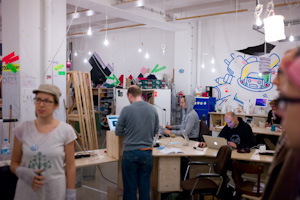 MM: I think 20-30% are international, a bit more in the
summer, because we have lots of international guests come with their whole office for
holiday in Berlin. We hold all our meetings in English because there is always
someone there who can't speak German. The oldest co-worker is probably 60, the
youngest are fresh out of college. A lot of our members are developers, journalists
and graphic designers. About 30% have just founded their own start-up, or have just
sold their company and are already working on their next one. They're doing their
second or third project, so its's a start-up, but they've already had plenty of
experience – they're rubbing shoulders with people who are fresh out of college.
MM: I think 20-30% are international, a bit more in the
summer, because we have lots of international guests come with their whole office for
holiday in Berlin. We hold all our meetings in English because there is always
someone there who can't speak German. The oldest co-worker is probably 60, the
youngest are fresh out of college. A lot of our members are developers, journalists
and graphic designers. About 30% have just founded their own start-up, or have just
sold their company and are already working on their next one. They're doing their
second or third project, so its's a start-up, but they've already had plenty of
experience – they're rubbing shoulders with people who are fresh out of college.
BJ: These days even school kids have launched their first start-up – successfully or unsuccessfully. The universities now have start-up centers where students can get professional advice and technical support.
MM: Yes, they want us to co-operate with them. Most are somewhere in [the outskirts] Dahlem Dorf or Adlershof. They are focussed on the science geeks, but aren't accessible for start-ups from the streets. Our first start-up experience was the Politikfabrik.
BJ: Your second project is done. Is it still exciting enough for you?
MM: Last April was the last time I said I was getting bored with the day-to-day business. Then our accounting system collapsed, so I wasn't bored for long!
The Betahaus embodies a new use of space, enabled by new technology
MG: About 12 years ago we built an internet database system for temporary use. We wanted to make it faster and easier to find empty spaces in the city. By simplifying these processes with technology, we hoped to encourage new experimental projects. We developed it as part of a European research project. Unfortunately, the project coordinators shifted the project's focus towards the theoretical and analytical aspects of temporary use, rather than the hands-on experiment that we needed to develop it. So our practical tool, the database, never reached the test phase.
MM: You should meet Tanja Mühlhans. A few weeks ago we asked her exactly that question, “Where are the empty spaces? How can we access them?” She said it would be pretty difficult to set up a transparent system.
MG: It's a big problem. Berlin's city planners are finally realizing how important these free spaces are. Twelve years ago, it was still uncharted territory. Back then, no serious architect considered temporary use a viable strategy. At the end of the day, there are many social and legal factors that make temporary use cumbersome.
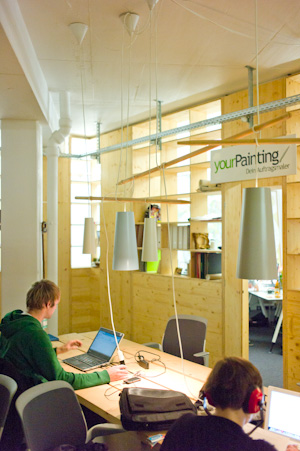 The Betahaus embodies a new use of space, enabled by new technology. Before the
mobile office it wasn't possible. These new kinds of opportunities will totally
transform our cities. What effect does it have on your daily life?
The Betahaus embodies a new use of space, enabled by new technology. Before the
mobile office it wasn't possible. These new kinds of opportunities will totally
transform our cities. What effect does it have on your daily life?
MM: A lot of people come in here and say, “Man, this is something I've always wanted, but I didn't even know that I was looking it!” On the other hand, we are still a tiny Kreuzberg start up, still running the risk that it won't work out. The dynamic range we work in is so much fun!
The Senatsverwaltung [Berlin government] drop by regularly. The current coalition agreement even has a clause supporting co-working spaces, but they are not quite clear on how or in what form. Two years ago we talked our heads off about it, but now suddenly the politicians are listening. Now they invite us to city hall, but three years ago when we could of used some help, nobody was there for us. It's a bit of a shame really, but on the other hand, we didn't let that stop us.
MG: Social acceptance takes a long time, and cities change so slowly. Politicians come and go, but the people in the administration are there for life. When you consider that they were trained in the seventies, and how much society has changed since then.
I like the working holiday concept. A colleague of ours told us how they flew their whole architecture office to the Canary Islands 15 years ago. They brought tables and drafting instruments with them to do a competition. Computerized drafting was still rare back then. They flew back with the model and left the table tops behind. These days this sort of thing happens all the time, thanks to cheap travel and places like Betahaus. What's it like when people come to Betahaus for their holiday?
We are an analogue space for all the digital bohemians who finally have a place to meet
MM: Our first traworker [travel-worker] came from Montreal with his wife. They came to Berlin for half a year, worked in Betahaus and made side trips around Europe. After that we had teams from Italy, France, Denmark and New York. The bring a breath of fresh air, and keep us up to date on what's going on in other cities. It's a bit sad, but we don't have enough time to travel. We have to be at our building every day, and when we aren't there, we're always afraid that something will go wrong. But that comes with the territory – our guests are well travelled, and international.
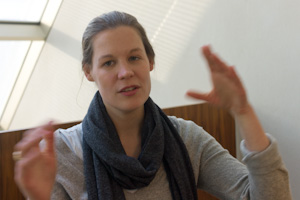 MG: You can talk and talk about technological
revolutions, but most businesses are bound to places. Only a few
actually live the traworking lifestyle – but it is obviously becoming more popular.
MG: You can talk and talk about technological
revolutions, but most businesses are bound to places. Only a few
actually live the traworking lifestyle – but it is obviously becoming more popular.
MM: We always say, “We are an analogue space for all the digital bohemians who finally have a place to meet.”
BJ: A real, real place, where even the tiniest details have a soul, is becoming more important now.
MG: That's exactly the kind of thing we are interested in. How do you create a place with a soul? Architecture is just one aspect.
MM: Our role is to create community. We have to be totally reliable. Nobody notices if our guests are there or not. No one can predict if five or 500 people will come to an event, but we have to be there, we always have to be there.